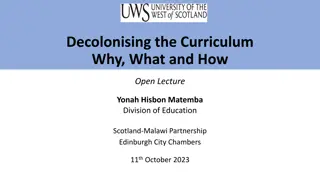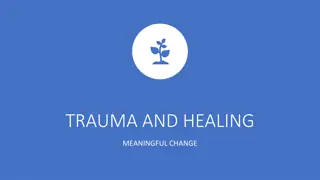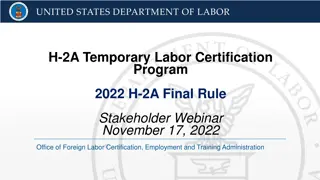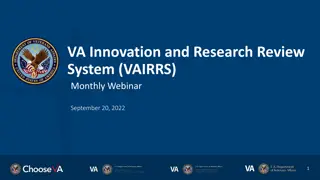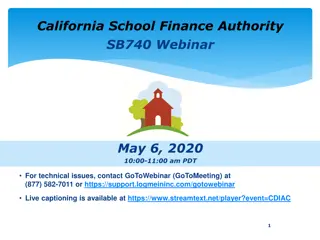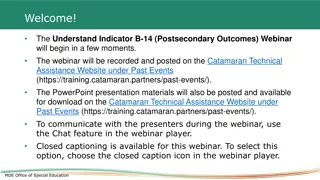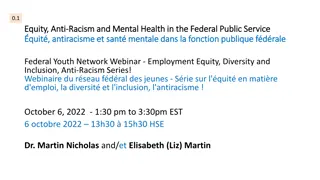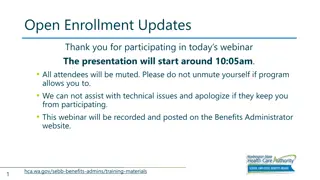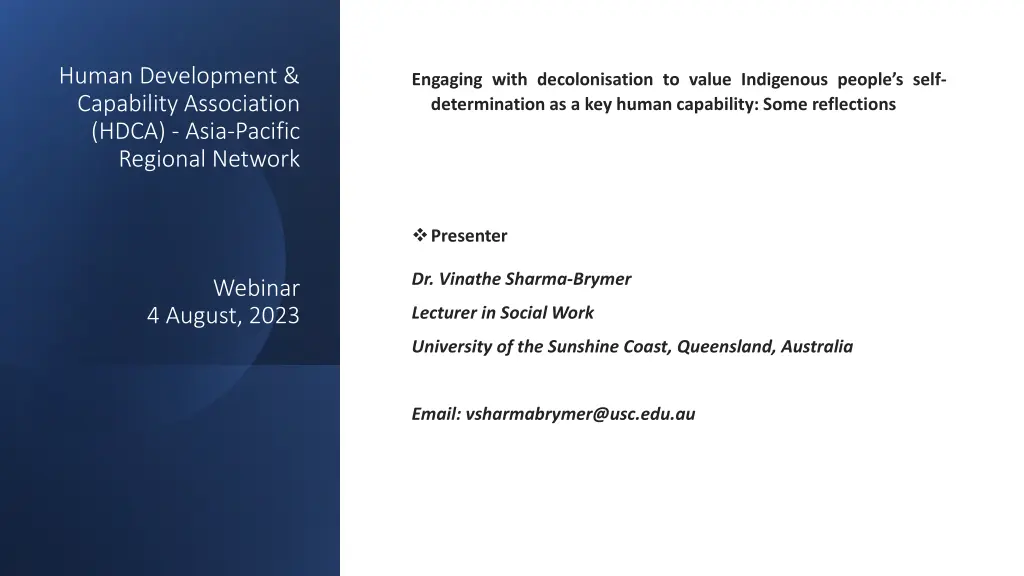
Exploring Human Development and Decolonization in Indigenous Perspectives
Engage with the theme of human development and decolonization in the context of Indigenous self-determination. Reflect on the impacts of colonization on Indigenous communities, focusing on Australia as a case study. Delve into the concept of decolonization and its importance in promoting human capabilities and social justice. Understand the essence of quality of life through the lens of human development and human capabilities, emphasizing the need for inclusive development that respects Indigenous values and aspirations.
Download Presentation

Please find below an Image/Link to download the presentation.
The content on the website is provided AS IS for your information and personal use only. It may not be sold, licensed, or shared on other websites without obtaining consent from the author. If you encounter any issues during the download, it is possible that the publisher has removed the file from their server.
You are allowed to download the files provided on this website for personal or commercial use, subject to the condition that they are used lawfully. All files are the property of their respective owners.
The content on the website is provided AS IS for your information and personal use only. It may not be sold, licensed, or shared on other websites without obtaining consent from the author.
E N D
Presentation Transcript
Human Development & Capability Association (HDCA) - Asia-Pacific Regional Network Engaging with decolonisation to value Indigenous people s self- determination as a key human capability: Some reflections Presenter Dr. Vinathe Sharma-Brymer Webinar 4 August, 2023 Lecturer in Social Work University of the Sunshine Coast, Queensland, Australia Email: vsharmabrymer@usc.edu.au Coast, Australia
As a staff member of UniSC, I acknowledge the Traditional Custodians of the lands and waters upon which my University campuses are located. These are the lands of the Kabi Kabi/Gubbi Gubbi people, the Butchulla people and the Yugarabul, Yuggera/Jagera and Turrbal people. Acknowledgement of Country I pay my respects to Elders past, present and emerging, and I recognise that these lands have always been places of learning and teaching for all.
Touching base with human development The key issue for this webinar s area of exploration Outline A quick check on colonisation and the impact on world s Indigenous peoples including their self-determination The country case study of Australia Decolonisation: What it is about, how it is approached and how it is everybody s engagement
Human development is about expanding the richness of human life rather than simply the richness of the economy. It focuses on people and their opportunities and choice (HDRO, 2015) Human development is having the quality of life one desires and values The human capabilities approach to quality of life advances human freedom and flourishing in terms of whether people are able to be and do desirable things in life (HDRO, 2015) Human development and human capabilities The human capabilities approach is also interested in social justice (Walker & Unterhalter, 2007).
So, what is quality of life? To be and able to do desirable things in life (freedom, flourishing, the richness of human life) The key issue for this webinar s area of exploration Many people around the world have still not been able to live the quality of life that they desire and value. Some of these are Indigenous peoples who are experiencing the impact of colonisation. They are default participants of many development programs to bring them up to the level of colonisers and their ways of life.
Colonisation What is colonisation? Taking over another s identity, access and participation as a person, community imposition of dominance, power and control Colonisation is more than physical. It is also cultural and psychological in determining whose knowledge is privileged. In this, colonisation not only impacts the first generation colonised but creates enduring issues (O'Dowd & Heckenberg, 2020)
Is a timeline, experience and memory etched in the minds of the oppressed and subordinated (intergenerational trauma) Is a set of changes to their ways of life knowing, being and doing (interconnectedness, values, skills, interpersonal relationships etc) Colonisation Current terms for colonised societies: Settler-nations, settled lands, settler-colonial countries In societies and/or countries where settler-colonisers are the dominant, the Indigenous peoples are struggling for self- governance, rights and their self-determination. For example, Canada, Australia. The Indigenous people s resistance and struggle are seeking to challenge and change White superiority, nationalistic history and truth (O'Dowd & Heckenberg, 2020).
Decolonisation currently implies restorative justice that people seek and engage with for their human freedoms such as cultural, spiritual, ecological, psychological Decolonisation is also expressing human capabilities of being and able to do things Challenging dominant beliefs, attitudes and practices; practising diversity, respect, acceptance and valuing each other decolonisation as a commitment and action taken to recognise the marginalisation of Indigenous knowledges and people , transform relationships in a way that dismantles oppressive relations of power, and reorient our work towards that which honours the sovereignty and deep knowledge of Indigenous people (ANU, n.d.). Decolonisation
https://youtu.be/e5JsNqJ94ks (7.37 minutes) In this episode -- Izzy, Inina, Shiloh, and Ha' ni talk to Executive Director of the Commission on Decolonization, Melvin Won Pat-Borja, about what a colony is, how colonization affects our island, why decolonization is important, and more! Decolonisation
The United Nations in 1945 noted some 750 million people lived in Territories that were dependent on colonial powers. The UN notes that currently there are 17 Non-Self- Governing Territories remaining and fewer than 2 million people live in them - https://youtu.be/yIg061CTxvs (6.53 minutes) The UN-led wave of decolonisation affirmed the principle of self-determination The UN-led decolonisation wave Is this still the case? Are all Indigenous peoples across the world free, autonomous and able to self-determine their quality of life?
Decolonisation is about taking responsibility for Decolonisation is for everyone, a TEDX talk by Nikki Sanchez. https://youtu.be/QP9x1NnCWNY (13.18 minutes). oppression This history is not your fault, but it is absolutely your responsibility. A history of colonization exists and persists all around us. Nikki discusses what colonization looks like and how it can be addressed through decolonization. An equitable and just future depends on the courage we show today. Let s make our grandchildren proud .
Indigenising, the challenge: Neocolonial systems and the problem of embracing diversity and acceptance Challenging deep-rooted colonial power and control; dominant discourses Challenging assumptions, prejudice, racism, bias, discrimination, exclusion, tokenistic attitude, entrenched beliefs of stereotyping Finding out more about disadvantage and exclusion Decolonising processes Decolonise through sustained resilience, healing, action, commitment to cultural responsiveness Through ongoing emphasis on Indigenous rights and self-determination Through human agency, freedoms and capabilities Human rights with social justice for social change
Effects of colonialism in Australia: The country case study of Australia: Policies of administration (Protection, Assimilation; Integration; NTER; Closing the Gap government social policy) Past welfare practices: Cultural dislocation (forced removals/disconnection) Stolen Generation; child removals; Anglo-Eurocentric policies and procedures Institutional racism & discrimination (schools & universities; government departments; community services; hospitals, etc) Key impacted areas of quality of life: Health, education, employment, housing, social inclusion, justice Indigenous issues and decolonisation from social work education and practice perspectives
The country case study of Australia: The country case study of Australia and the issues impacting on the lives of Aboriginal and Torres Strait Islander peoples Indigenous issues and decolonisation Welfarism, racism, Anglo-Eurocentric ways of life; human rights advocacy not fully valuing Indigenous rights, interrogation of Indigenous issues not fully understanding Indigenous self-determination (Briskman, 2014). from social work education and practice perspectives Ongoing struggle for Indigenous rights and self- determination Voice to the Parliament Referendum 2023
Aboriginal people are neither the problem nor the cause of the problem. It is not Aboriginal people or culture or communities that need to be fixed. The problem is colonialism, a condition that permeates every part of Australian society and that includes our profession and the manner in which we exist and operate (Green & Bennett, 2018, p. 262) The country case study of Australia: Decolonisation and Aboriginal and Torres Strait Islander peoples Decolonising practice involves a reclaiming of key values such as trust. Decolonising practice is a value laden practice, where we centre feelings like fear and loss, because decolonising is about losing privilege, power and identity. These losses evoke fear, particularly in the practitioner who, in a settler society, is not accustomed to such discomforts. This practice tunes in to plural voices; it makes everyone aware of their vulnerability, their interdependence and interconnectedness (Walter & Baltra-Ulloa, 2019, p. 77)
Decolonization is a method required to shift the current paradigm of Western dominance and colonial amnesia that constructs and maintains Indigenous poor health status. Decolonization requires acknowledging that dominants ways of knowing have been historically and institutionally contrived. They are ways of knowing that are no longer useful or healthy for any Australian. Australia requires a contextualized discourse for re-claiming knowledges informed through a balance of truths and histories. Reflecting upon the cause and effect of past action and its policies rather than continued constructs of problematizing those who have survived such events. The country case study of Australia: Decolonisation and Aboriginal and Torres Strait Islander peoples Sherwood, (2014) in IAHA (2019)
Decolonisation is not a simple act, it is a journey that requires more than simple words and cannot be achieved in a short time frame (Green & Bennett, 2018, p. 262) Bottom-up approach involving all people at all levels Open and effective communication between all people, at all levels Both individual and collective accountability between and across communities Actions of decolonisation in every day life Social workers in Australia can engage with: Local and global advocacy Focus on the rights of Indigenous peoples Advocacy for self-determination Cultural awareness, safety and responsiveness in professional education, training, practice Values and ethics: Person in environment, respect and dignity, social justice
Culturally respectful and responsive services Creating culturally welcoming and safe space for service users Integrating Indigenous knowledges and perspectives (ways of knowing, being, doing) Ways of working that strengthen cultural identity and integrity Making efforts towards being trusted in the community Decolonisation actions in personal, professional and public life
Across community and academic research Actions of decolonisation Participatory action research involving community members Collaborative partnerships Collaborative consultations
The United Nations Declaration on the Rights of Indigenous people, 2007. Indigenous people s right to self-determination is paramount to their quality of life, enjoying their capabilities. Indigenous rights for realising self-determination can change their human freedoms for being able to do . Being able to pursue development from all domains economic, political, social, cultural, spiritual and so on. Actions of decolonisation The UNDRIP (2007) lists several key rights in the process of decolonisation, including: the right to autonomy and self-governance freedom from forced removal of children protection of archaeological and historical sites, and repatriation of ceremonial objects and human remains the right to provide education in their own language state-owned media should reflect Indigenous cultural diversity legal recognition of traditional lands, territories and resources (O'Dowd & Heckenberg, 2020)
In this contested space between the two knowledge systems, the cultural interface (Nakata, 1998), things are not clearly black or white, Indigenous or Western. In this space are histories, politics, economics, multiple and interconnected discourses, social practices and knowledge technologies which condition how we all come to look at the world, how we come to know and understand our changing realties in the everyday, and how and what knowledge we operationalise in our daily lives (Nakata, 2007, p. 9). Actions of decolonisation Decolonisation process happens with self-awareness and self-examination
Self-awareness: Know your self values, beliefs, attitudes, perspectives, knowledges and life experiences How do I engage in decolonisation process? How can I make practice-related decisions? Actions of decolonisation Who do I work with? How do I do this? Personal and professional responsibility and accountability; proactivity for involvement and leadership Respect, dignity, social justice, personal and professional integrity Interface between the Indigenous and non-Indigenous Celebrating beliefs, values and knowledges of the individual and community Professional accountability for providing all perspectives for all Challenge self and others to examine perspectives with critical analysis and reflections It is an ongoing process and the journey is personal and different for each individual person
Being aware of motivations behind implementing decolonisation perspectives and actions Understanding and working with community consultations Understanding contexts of a diverse range of resources Developing techniques for critical evaluation of resources Challenging stereotypes and beliefs about all people Acknowledging the impact of past and current government policies Understanding the impact of colonisation and moving towards decolonisation Recognising the influence of media representation on societal beliefs and attitudes Actions of decolonisation
Australian National University. (n.d.). Decolonial possibilities. Available from https://decolonialpossibilities.anu.edu.au/resources/ Briskman, L. (2014). Social work with Indigenous communities: A human rights approach (2nd edition). The Federation Press. References Human Development Report Office. (19 February, 2015). What is human development? https://hdr.undp.org/content/what-human-development Green, S. & Bennett, B. (2018). Wayanha: A decolonised social work. Australian Social Work, 71(3), 261-264. https://doi: 10.1080/0312407X.2018.1469654 Nakata, M. (2007). The cultural interface. The Australian Journal of Indigenous Education, 36 (Supplement), 7-14. O'Dowd, M. & Heckenberg, R. (June 23, 2020). Explainer: What is decolonisation? The Conversation. https://theconversation.com/explainer-what-is-decolonisation-131455 Walker, M. & Unterhalter, E. (2007). The Capability Approach: Its potential for work in education. In M. Walker & E. Unterhalter (Eds). Amartya Sen s Capability Approach and Social Justice in Education. Palgrave Macmillan. https://doi.org/10.1057/9780230604810_1 Walter, M. & Baltra-Ulloa, J. (2019). Australian social work is white. In B. Bennett & S. Green (Eds.). Our voices: Aboriginal social work. Bloomsbury Publishing Plc.



